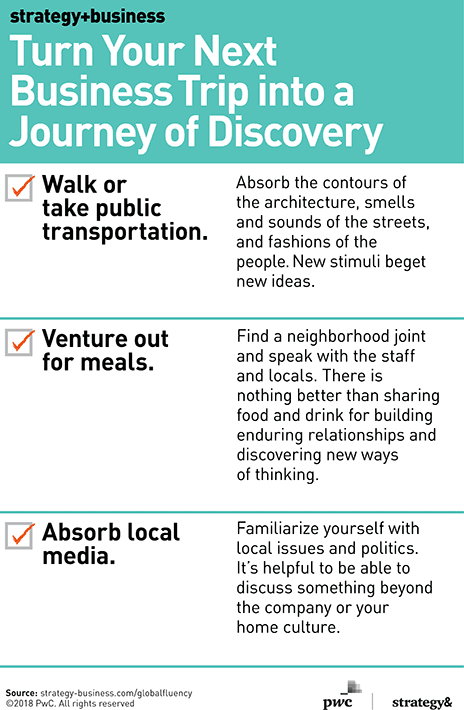Increasing Your Global Fluency
For recent grads and seasoned executives alike, on-the-ground experience in foreign locales can help you bridge your global skills gap and increase your ability to innovate.
Being a global-minded leader goes beyond basic issues of etiquette, ordering for yourself in a foreign language at a business dinner, or finding your way around a foreign city. The ability to see and understand perspectives beyond your own is invaluable as you confront complex problems and opportunities in business and in society. It helps you spot both pitfalls and opportunities.
For individuals, both those new to the workforce and seasoned executives, nurturing a global perspective pays dividends now and develops the mind-set and skills that make a person more valuable (and less likely to be replaced by AI) over time.
For companies, research shows that there are myriad benefits to attracting employees with cultural fluency and suggests that firms should consider using global acuity in their screening at all levels as they pursue the creativity, agility, and comfort with ambiguity that business requires.
International experience has been shown to help managers overcome cultural barriers on teams. Further, speaking different languages and developing a true appreciation for an ethos beyond your own affects how you think. Researchers at Penn State found that learning a new language physically changed the brain and strengthened neural networks. Benefits accrue in memory, perception, and sorting the most important information from a mass of data. It may even improve decision making.
Kelvin Thompson, founder of global executive search firm MontaRosa, told me, “Our experience shows that if a company wants to be market-leading, its executive team must be rich in global fluency because competing globally means attracting and retaining the best talent locally. Increasingly, respect and motivation between executives and employees are two-way. So for several years, we’ve been assessing candidates not simply for international experience but, more important, on understanding verbal and nonverbal exchanges, expressing socioreligious empathy without judgment, and appreciating the role of family in society. Being a successful global executive requires curiosity about and acceptance of different cultures.”
This kind of openness and continual learning are the wellsprings of innovation. Diving into a place — its customs, food, art, music, and history — challenges assumptions and orthodoxies. It stimulates fresh thinking and engenders new mental models. The rewards are not simply that you learn about a culture; you’ll grow personally as well.
Diving into a place — its customs, food, art, music, and history —challenges assumptions.
Unfortunately, though the demand for global-minded leaders is higher than ever, they are in short supply among both those in the workforce and those just entering. In a 2017 CBI/Pearson Education and Skills survey (pdf) in the United Kingdom, only 34 percent of responding employers were satisfied with applicants’ foreign-language skills. More than one-third, 39 percent, were unhappy about their international cultural awareness. That squares with an Economist Intelligence Unit (EIU) survey that looked at those who had just completed either an undergraduate or graduate program. It showed that just 26 percent of U.S. students took advantage of foreign-language programs. Only 12 percent studied what they thought was a global curriculum.
When it comes to professionals already in the workplace, the story is much the same: 42 percent of managers fail in overseas assignments, with a lack of cultural intelligence being an important factor, according to a study from Right Management. A separate Right Management report (pdf) shows that almost a third (32 percent) of global-leader assignment failures were attributed to a cultural mismatch. That came in second to an inability to build relationships among team members, at 40 percent. Arguably, the right cultural fit would go a long way to correct that problem.
Recent graduates have opportunities to start early on the path to being truly global executives. Some, such as teaching English, are not new, and others are just emerging.
One such program is run by Professional Passport, a company that assesses and coaches executives in cultural fluency. Here’s how it works: Recent college graduates who have completed some of their studies abroad undertake a summer internship in a foreign country and, based on the successful completion of the internship, are offered employment as international local hires. During the global apprenticeship, Professional Passport partners with the employee and employer to transform life and work experiences into skills necessary for success in the global workforce. The program takes participants to up to four countries, where they will learn multiple languages, explore each country’s distinct culture, and experience its business environment.
Such an intense experience takes these recent grads beyond the bubble of the predictable hotel chains and airport lounge cuisine that most business travelers encounter. They have no choice but to open their eyes, ears, mind, and heart.
For established executives, the same is true, and the experiences are just as accessible as if you were in a program, if you make the effort to uncover them. Cultural ignorance can cause reputational damage and may even scuttle a business deal. For me, that’s why I always try to acclimate myself to a place and its culture and see some local sights before I delve into the nitty-gritty work of a business trip.
For example, a few months ago I arrived a day early in Moscow, where I was set to conduct a leadership training session. I explored the city center, and while admittedly I did get a bit lost here and there, it was worth the blisters. Wandering Moscow reacquainted me with the language, which I studied in my younger days; the history that shaped Russia’s view of the world; and the uneven distribution of affluence across the population today. It allowed me to better understand my leadership trainees and have more nuanced ways of connecting with them.
Whether you’re new to the workforce or a veteran business traveler, here is a short primer on how to turn your next work trip into a journey of discovery.
Walk or take public transportation. Suppress your instinct to hop in a cab or summon a car service, and travel with the locals instead. Getting out of an automobile puts you into the rhythm of a place. If you can keep your phone in your pocket, you will be stimulated by the contours of architecture, the smells and sounds of the streets, and the fashions of the people. New stimuli beget new ideas.
Wandering around Shanghai helped me see that while authority receives deference in political spheres, it is openly flouted in commerce. Renting a bike to get around Munich gave me a bonding commuting experience with my hosts and an early appreciation for how to build non-auto-centric urban infrastructure.
Venture out for meals. Indulge in street food or find a neighborhood joint. Whether a “dirty-water dog” on the streets of New York, chicken rice in Singapore, or fish-and-chips in Aberdeen, food reveals the soul of a place and the people who live there. Perhaps more important, it also presents an opportunity to get people talking. When your local colleagues take you to a place that means something to them, you often learn about their families and traditions. There is nothing better than sharing food and drink for building enduring relationships.
A side benefit: A conversation over dinner in the Middle East alerted me to concerns about the fragility of certain regimes well ahead of events that made world news.
Read and watch local media. It is easier than ever to stick with the familiar, thanks to your Wall Street Journal app or CNN International that streams into almost every hotel room. They tell you little about what’s going on where you are. Whether you are recruiting talent or scouting a market opportunity, it pays to be able to discuss something beyond the company or your home culture. Whether abroad or in a different city in the U.S., I familiarize myself with local issues and politics to better understand the nuances affecting the business climate.
Global enterprises often strive for a consistent worldwide culture. The best find a balance between global and local. They celebrate the diversity of their people and their experiences as much as they cultivate consistency of values and principles. When you are one who is linguistically and culturally fluent, you will find yourself much in demand. You will also have a rewarding career and, more important, life.






